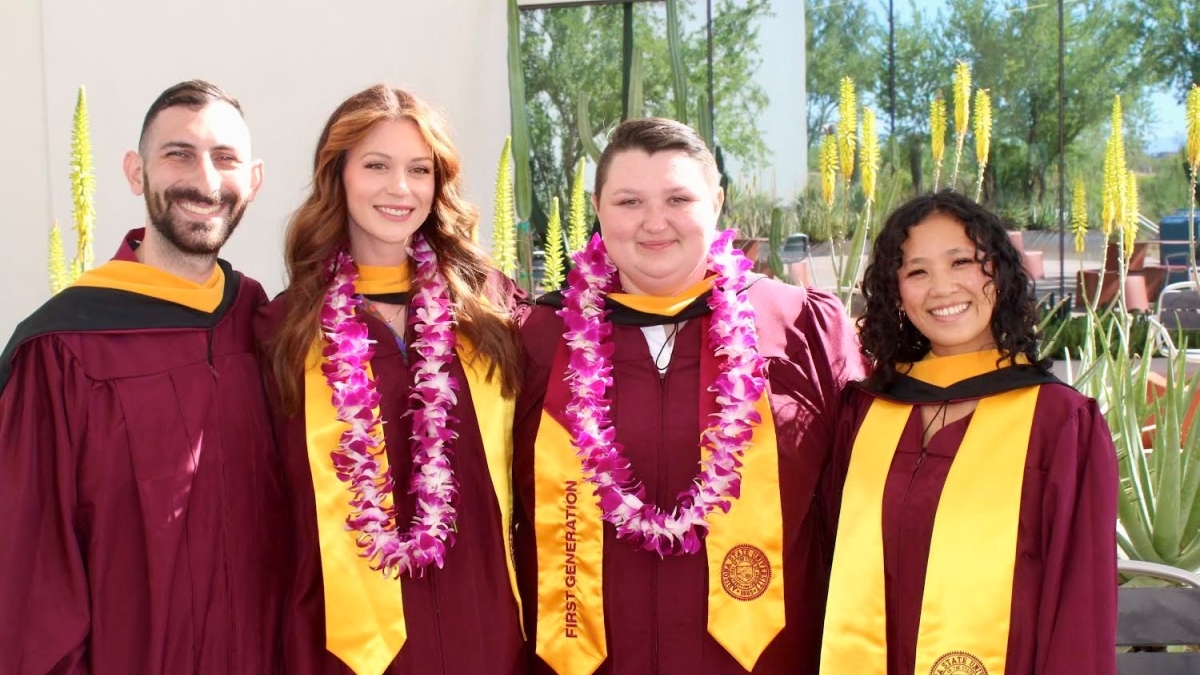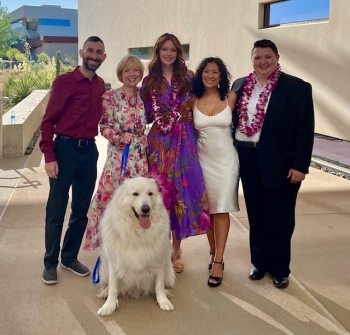ASU’s first genetic counseling master's students complete their work

(From left) Daniel Gottlieb, Tessa Nelson, Alyssa Rosetta and Cassidy Pedraza, the first cohort of ASU's Master of Science in genetic counseling, pose for a photo during the College of Health Solutions Convocation in May. Photo courtesy of Katherine Hunt Brendish
It's not every student that can say they know everyone in their degree program.
But the first cohort of Arizona State University’s Master of Science in genetic counseling housed in the College of Health Solutions can easily make that claim.
The four students, now alumni, who completed the rigorous qualifications necessary to earn a degree in that challenging field, got to know each other well in the two years they were together. Some favorite memories include poolside study sessions, the occasional lunch when busy schedules would allow and, of course, celebrating the end of a semester.
“Our smaller class size in comparison to other genetic counseling programs has allowed us to develop a friendship and bond for life,” Tessa Nelson said.
Nelson recently accepted a position as a prenatal genetic counselor working in the Phoenix area.
“Becoming a prenatal provider is what initially sparked my interest in genetic counseling, so to see it materialize is a dream come true,” Nelson said. “The ability to educate and empower patients through their family-planning decisions is near and dear to my heart. Additionally, practicing in Arizona not only allows me to remain connected with the ASU program, but also positions me to advocate for the vital role of prenatal genetic counselors in a state where they are critically needed.”
The growing need for genetic counselors in general is a large part of the reason the program began in fall 2022. According to the National Association of Genetic Counselor’s 2022 professional status survey, there were only 25 genetic counselors in Arizona. Based on the recommendation that there should be at least one genetic counselor per 75,000 people, there should be a statewide increase of more than 70 to meet that ratio.
Program Director Katherine Hunt Brendish said two years ago:
“It’s only getting bigger. The reason is there is more genetic testing and information out there than ever before.”
Genetic research has captured the public’s attention in recent years as scientists have made important discoveries resulting in promising treatments for a variety of diseases and conditions.
All of that groundbreaking research has led to a need for more genetic counselors to help patients understand their risk for a variety of genetic conditions and help alleviate some of the stress in making treatment decisions.
As a result, the master’s degree program in genetic counseling is also looking to grow.
One of the main hurdles facing growth within the program is clinical placements, which are crucial to the training. Hunt Brendish is working to establish relationships with potential community partners to help find more of those placements.
“They’re so critical,” she said. “They just have to be in place before we can take on the extra two or three students.
“But the goal is to continue to grow. As we get more students into the job market, (specifically) in the Arizona market, I think we’ll have a better opportunity to admit more students.”
Hunt Brendish said she was proud of that first cohort of students and how they overcame challenges, both professional and personal.
“They all had lives outside of school, working or having children or families,” she said. “They were grateful that there was enough flexibility in the program that they could manage school and their outside lives.
“After graduation, they were very sweet and very grateful for the work we put in trying to get them across the finish line.”
Weldon Johnson passed away on Sept. 20. This was his final story for the College of Health Solutions. ASU News sends our deepest condolences to his team and loved ones.
More Health and medicine

Health Solutions graduate trains to become a better health educator
Editor’s note: This story is part of a series of profiles of notable fall 2024 graduates.At almost 15 years old, Robyn Colao, who is now graduating from the health sciences program at the …
ASU team part of nationwide study looking at Type 2 diabetes in youth
Near the end of an interview in which he talked about the work his team will be doing to tackle the rise in Type 2 diabetes among youth, Arizona State University Professor Gabe Shaibi answered why…
Leading the way in wellness: ASU highlighted in The Princeton Review's 2025 Mental Health Services Honor Roll
Being a college student isn’t easy — navigating new routines, people and places can be a challenge, especially if the right support system is not in place. That's why Arizona State University is a…
